This week in TV Guide: September 1, 1973

 Growing up, there were certain things that were simply part of the American fabric, events you noticed whether you were interested in them or not. The Miss America Pageant was one of those events. It seemed as if everyone watched Miss America, even though we know that wasn't the case, and while a particular contestant would occasionally capture the hearts of everyone (usually with a winning smile and a particularly spectacular talent presentation), most of the time people tuned in to see if their state's entrant would win. (There were always headlines in the papers on Monday if Miss Minnesota won, which she did three times; the pageant usually ended too late for it to make the Sunday paper.)
Growing up, there were certain things that were simply part of the American fabric, events you noticed whether you were interested in them or not. The Miss America Pageant was one of those events. It seemed as if everyone watched Miss America, even though we know that wasn't the case, and while a particular contestant would occasionally capture the hearts of everyone (usually with a winning smile and a particularly spectacular talent presentation), most of the time people tuned in to see if their state's entrant would win. (There were always headlines in the papers on Monday if Miss Minnesota won, which she did three times; the pageant usually ended too late for it to make the Sunday paper.)The pageant isn't until next week, but this week J. Robert Conroy has an article about his uncle, Ed Corcoran, who took over the pageant in 1935. At that point the pageant had endured a colorful, if checkered, early history; if you ever wondered, for instance, why some of the pageants included contestants identified as Miss Chicago and Miss New York City, or that Miss Toronto and Miss Winnipeg once competed to become Miss America, the answer is that the pageant was founded on the idea of increasing tourism in Atlantic City, which is approximately 100 percent dependant on the tourist trade, so if having a Miss Chicago or a Miss Toronto meant more tourists, "that was just dandy with Atlantic City." (In fact, Miss America 1925 was Norma Smallwood, Miss Tulsa. Also landing in the top 15 was Miss Dallas, Rosebud Blondell, better known today as Joan.)
Conroy is frank in stating that his Uncle Ed "ran a leg show, and that was it, period. There wasn't a baton-twirler in the bunch. He wouldn't even let the girls talk, let alone answer cute questions on stage to demonstrate whatever it is that part of the program is supposed to demonstrate." It wasn't that they didn't have talent, "he just believed that things would be better if they kept it to themselves." Contestants would go through a tortuous evening of turning to the left, turning to the right, walking back and forth across the stage, and then turning left and right again, while the judges bickered amongst themselves, plugging for their personal favorites. It took hours; "As often as not, the crowning of the new queen dragged on well beyond midnight into the small hours of Sunday morning, much too late to make any of the Sunday papers, whose representatives had long since fallen asleep in their chairs."
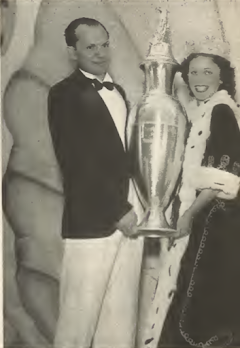 Ed Corcoran with Miss America 1935,
Ed Corcoran with Miss America 1935,Henrietta LeaverThe modern Miss America Pageant began to emerge when Leonra Slaughter took the reins following Corcoran's death; whereas Corcoran built it into a successful tourist event, "an obviously successful device to get the Atlantic City name in print as a place very much alive after Labor Day as well as before," Slaughter took it further, tailoring it for a television audience, and building up sponsors who would provide the money for the pageant's scholarship fund. She also worked with the Junior Chamber of Commerce to take over sponsoring local contests—movie houses had been the primary sponsors prior to that.
Conroy, who became a press agent and whose connection with the pageant had continued after his uncle's death, recounts his own involvement with the Jaycees in their first running of the Miss Chicago pageant. Before the night was over, he found himself serving as the one and only judge of the contest. "So, I picked this long-legged blonde stunner and wrote a rave letter back to Lenora that my beauty was going to win all the marbles. She didn't, but she did make the semifinals. Maybe you can imagine the pride I felt when I saw Cloris Leachman walk on a stage once again, earlier this year —to accept her Emmy."
Conroy notes that "They don't make Miss America Pageants any more the way they used to," and this was back in 1973. Through the years, the pageant suffered the backlash from the woman's lib movement, sex scandals, and more, and cratered during the disastrous tenure of Gretchen Carlson (the last Miss Minnesota to become Miss America) as head of the organization. The pageant moved from Atlantic City to a casino arena in Connecticut, and was dropped from network television. In fact, looking at the information online, the date and location for this year's pageant haven't even been decided yet. It's too bad, but not surprising, Times change, as I'm always saying, and there's no reason to think that Miss America wouldn't be part of the changes. It's just one more event that's disappeared from our common American experience.
l l l
It's always nice to get the Soviet perspective on things, and Richard K. Doan reports that the Russians are accusing Sesame Street of being an "imperialist plot," designed to foster concepts such as "private enterprise and the importance of money." Even though Doan says American shows such as Mighty Mouse, Lassie, and Daktari have been seen on Russian TV (not to mention The Rifleman), the Soviets fear that Sesame Street's "cultural imperialism" could infiltrate Soviet homes when global satellite networks come into being. The Children's Television Workshop points out that Sesame Street already airs in 50 countries, and predicts that someday the show will be shown in the USSR. Close; after the fall of the Soviet Union in 1993, Ulitsa Sezam premieres.
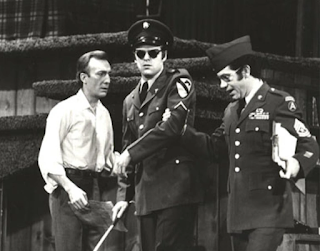 Over at the Tiffany Network, CBS is recoving from a recent double-battering of controversy, starting with the presentation of the movie ◀ Sticks and Bones on August 17. The movie skewered the facade of the "ideal Amerian family," telling the story of a blind and embittered Vietnam veteran named David, his brother Rick, and his parents Ozzie and Harriet. A touchy topic to be sure, but even so the response from the network's affiliates is surprising: 94 of the 186 stations refused to carry Sticks and Bones, although in eight cities it was carried by non-CBS affiliates. One CBS insider, who said that the show was "not even good drama," guessed that "the tune-out in the first half hour must have been astronomical."
Over at the Tiffany Network, CBS is recoving from a recent double-battering of controversy, starting with the presentation of the movie ◀ Sticks and Bones on August 17. The movie skewered the facade of the "ideal Amerian family," telling the story of a blind and embittered Vietnam veteran named David, his brother Rick, and his parents Ozzie and Harriet. A touchy topic to be sure, but even so the response from the network's affiliates is surprising: 94 of the 186 stations refused to carry Sticks and Bones, although in eight cities it was carried by non-CBS affiliates. One CBS insider, who said that the show was "not even good drama," guessed that "the tune-out in the first half hour must have been astronomical." As if the network hadn't already bought enough trouble, there was also the repeat of the two-part "Maude's Dilemma" story on the popular sitcom, in which Bea Arthur's character has an abortion. The show had been somewhat controversial when it was originally aired in November 1972, but by the time the network decided to repeat the story in August, a campaign had been organized against the network; this time, 39 affiliates chose not to air the episodes (only two had done so on first showing), and CBS received more than 17,000 letters of protest, twice as many as they'd gotten back in November. (I wonder what kind of overlap there was on affiliates who chose not to carry either show?) One can understand why CBS chose to burn the shows in August, before the start of the new season.
Oh, and as if that weren't bad enough, the first ratings are in for the new CBS Morning News with Hughes Rudd and Sally Quinn. "Nielsen reported New Yorkers switched heavily to the [Rudd-Quinn] newscast the first week—then returned in large numbers to the Today show."
l l l
This week's TV Teletype gives us a look at some coming attractions, including a made-for-TV remake of the classic Miracle on 34th Street, starring Jane Alexander, David Hartman, and Sebasian Cabot, which can be seen December 14 on CBS. This movie has its fans, but I'm not one of them; when you have an original like Miracle, what can you possibly add that would make it worthwhile? Oh, and I particularly appreciate the shots of all those lush, non-evergreen trees in full leaf; I understand how telemovies with short production times have to shoot in summertime, but it still makes it look as if you're not even trying.
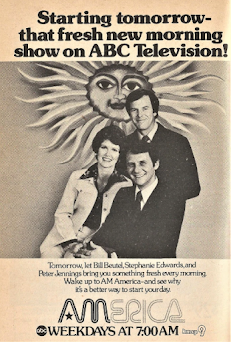 ABC's working on a morning show of its own, to compete against Today and the CBS Morning News. The network is hoping to have its yet-unnamed show on the air by January 1; Steve Mills, the VP heading up the project, says it "will probably have a team of personalities, a host and/or hostess, sports elements and a variety of specialists." Sounds like every other morning show, doesn't it? In the event, the show, AM America, doesn't premiere until January 6, 1975, and never finds a footing; it's replaced that November by Good Morning America, hosted by the aforementioned David Hartman.
ABC's working on a morning show of its own, to compete against Today and the CBS Morning News. The network is hoping to have its yet-unnamed show on the air by January 1; Steve Mills, the VP heading up the project, says it "will probably have a team of personalities, a host and/or hostess, sports elements and a variety of specialists." Sounds like every other morning show, doesn't it? In the event, the show, AM America, doesn't premiere until January 6, 1975, and never finds a footing; it's replaced that November by Good Morning America, hosted by the aforementioned David Hartman.We're also told that Jerry Lewis has a big lineup in-store for his annual Labor Day Telethon, airing this weekend. Stars include Rowan and Martin, Dionne Warwicke, Buddy Hackett, Johnny Cash, Tony Curtis, Merv Griffin, Connie Stevens, Peter Falk, and Bobby Darin. And speaking of stars, the latest trend features sports stars in acting roles; boxer Jerry Quarry is playing a bouncer on The Magician, former baseball player Maury Wills is appearing on Adam's Rib, and O.J. Simpson guests on Here's Lucy. There's apparently no truth to the rumor that Simpson had originally been considered for a remake of Run for Your Life.
l l l
But enough of industry news; what's actually on the tube this week? It's the last week before the beginning of the new fall season (the highly-anticipated Fall Preview comes out next week; I reviewed it here ), but there are still things that merit your attention.
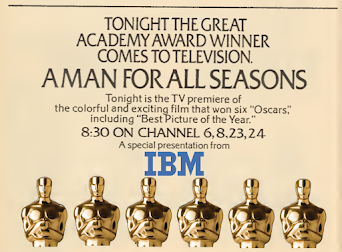 The highlight is Wednesday night's special presentation on NBC, the television premiere of 1966's Best Picture winner A Man for All Seasons (Wednesday, 8:30 p.m. PT), starring Oscar winner Paul Scofield as Sir Thomas More, who was martyred by the psychotic Henry VIII for refusing to recognize the king's divorce from Catherine of Aragon. The movie won six Oscars in total; Judith Crist calls it "a thinking man's spectacular," "a gripping human drama in which the passions and turbulence are underplayed, a probing study of conscience whose complexities and subtleties are indicated with brilliant clarity and whose contemporary significance is forcefully presented by implication alone." Interestingly, NBC plans to repeat the movie the following Sunday afternoon as part of NBC Week. I think I've mentioned this before, but this is a movie that took a long time to grow on me; I finally made the commitment a few years ago, and now it's part of my library; it is, indeed, a great movie.
The highlight is Wednesday night's special presentation on NBC, the television premiere of 1966's Best Picture winner A Man for All Seasons (Wednesday, 8:30 p.m. PT), starring Oscar winner Paul Scofield as Sir Thomas More, who was martyred by the psychotic Henry VIII for refusing to recognize the king's divorce from Catherine of Aragon. The movie won six Oscars in total; Judith Crist calls it "a thinking man's spectacular," "a gripping human drama in which the passions and turbulence are underplayed, a probing study of conscience whose complexities and subtleties are indicated with brilliant clarity and whose contemporary significance is forcefully presented by implication alone." Interestingly, NBC plans to repeat the movie the following Sunday afternoon as part of NBC Week. I think I've mentioned this before, but this is a movie that took a long time to grow on me; I finally made the commitment a few years ago, and now it's part of my library; it is, indeed, a great movie.Among the movie repeats are a couple of successful pilots: Toma (Wednesday, 8:30 p.m., ABC), starring Tony Musante as the detective who's a master of disguise, and The Six Million Dollar Man (Tuesday, 8:30 p.m., ABC), with Lee Majors as the man-machine. Crist likes the first, but finds the second "somehow wholly unappetizing." Musante leaves Toma after one season, with the series then morphing into Baretta, while The Six Million Dollar Man thrives for five successful seasons, even generating the Bionic Woman spin-off.
My earlier mention of the Jerry Lewis Telethon (Sunday, 7:30 p.m., KFSN in Fresno; 8:30 p.m., KERO in Bakersfield) reminds me that it's Labor Day weekend, with the attendant sports highlights. CBS presents coverage of the first weekend of the U.S. Open tennis championships (Saturday at 1:00 p.m., Sunday at 12:00 p.m.), while on Labor Day itself, it's the world's richest horse race, the All-American Futurity, from Ruidoso Downs, New Mexico (4:30 p.m., syndicated). The third jewel of the quarter-horse triple crown pays the winner $330,000, while the runner up makes $138,000—nearly as much as first prize in the Kentucky Derby. It's still run every Labor Day, televised on the Cowboy Channel, and though it's not the world's richest race, the winner takes home over $1 million, making it the richest race of any kind for two-year olds. I used to watch this every year; it was a nice wind-down from the Telethon.
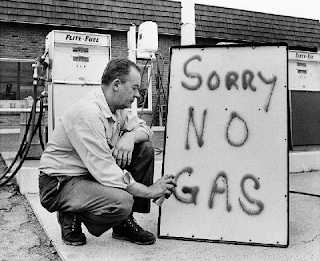 On Tuesday, NBC devotes its entire prime-time to a three-hour NBC Reports special on the Energy Crisis (8:00 p.m.), which is also the subject of a Neil Hickey piece asking "Will the Lights Go Out All Over the World?" The report's three major segments focus on coal (cheap and safe, it's 7"our most abundant and inexpensive source of energy"), nuclear power ("the risk is small—but we don't know how small"), and oil ("Wells are pumping at full force, yet more and more filling stations are running dry"). Fifty years later, the successful intertwining of energy with climate change means coal is out of the question, nuclear energy is too dangerous, and oil is killing the planet. What it all means, other than that the eco-warriors have a very good public relations machine, is anybody's guess.
On Tuesday, NBC devotes its entire prime-time to a three-hour NBC Reports special on the Energy Crisis (8:00 p.m.), which is also the subject of a Neil Hickey piece asking "Will the Lights Go Out All Over the World?" The report's three major segments focus on coal (cheap and safe, it's 7"our most abundant and inexpensive source of energy"), nuclear power ("the risk is small—but we don't know how small"), and oil ("Wells are pumping at full force, yet more and more filling stations are running dry"). Fifty years later, the successful intertwining of energy with climate change means coal is out of the question, nuclear energy is too dangerous, and oil is killing the planet. What it all means, other than that the eco-warriors have a very good public relations machine, is anybody's guess.William Conrad does a Cannon double-dip on Wednesday, first playing the portly detective in a sketch on The Sonny and Cher Comedy Hour (8:00 p.m., CBS), where he "searches for baddies at Sonny's pizza parlor"; as himself, Conrad also sings "The Men in My Little Girl's Life." (Rick Springfield is the musicial guest, by the way, singing "What Would the Children Think?") Later, on his own show (10:00 p.m., CBS), Cannon tries to save attorney Jessica Walter from someone who wants her off her latest case.
Thursday night offers sports and music; at 6:00 p.m. on CBS, it's an NFL practice—I mean, "exhibition"—game between the last two Super Bowl champions, as the Miami Dolphins take on the Dallas Cowboys. In truth, though, exhibition games were much different back then, as the starters often played at least half the game, playing themselves into shape. Over at ABC, Tony Bennett and Lena Horne join forces for an hour of music—"and no variety-show small talk." (9:00 p.m.) Fourteen songs are on the menu, with another 24 covered in a medley saluting composer Harold Arlen (including "Over the Rainbow," "Stormy Weather," and "Come Rain or Come Shine.")
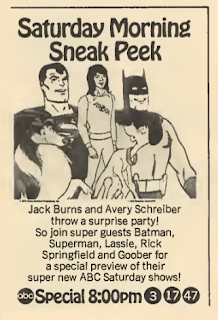 Friday night ABC and NBC air primetime specials touting their new Saturday morning lineups. ABC's Saturday Morning Sneak Peak (8:00 p.m.) is hosted by Jack Burns and Avery Schreiber, with Rick Springfield (Mission: Magic!), Lassie (Lassie's Rescue Rangers), and new offerings from Batman and Superman (Super Friends), Yogi Bear (Yogi's Gang), and Goober (Goober and the Ghost Chasers). Meanwhile, NBC Starship Rescue (8:30 p.m.) touts the new animated Star Trek, Butch Cassidy and the Sundance Kids, Go!, and appearances by Kevin Tighe and Randolph Mantooth (Emergency +4) and Johnny Whitaker, Scott Kolden, and Billy Barty (Sigmund and the Sea Monsters). CBS, not to be left out, has a repeat of Weird Harold, one of Bill Cosby's creations, featuring Fat Albert and more of his friends. I was pretty much over the Saturday morning scene by then, but these shows just sound painful to me.
Friday night ABC and NBC air primetime specials touting their new Saturday morning lineups. ABC's Saturday Morning Sneak Peak (8:00 p.m.) is hosted by Jack Burns and Avery Schreiber, with Rick Springfield (Mission: Magic!), Lassie (Lassie's Rescue Rangers), and new offerings from Batman and Superman (Super Friends), Yogi Bear (Yogi's Gang), and Goober (Goober and the Ghost Chasers). Meanwhile, NBC Starship Rescue (8:30 p.m.) touts the new animated Star Trek, Butch Cassidy and the Sundance Kids, Go!, and appearances by Kevin Tighe and Randolph Mantooth (Emergency +4) and Johnny Whitaker, Scott Kolden, and Billy Barty (Sigmund and the Sea Monsters). CBS, not to be left out, has a repeat of Weird Harold, one of Bill Cosby's creations, featuring Fat Albert and more of his friends. I was pretty much over the Saturday morning scene by then, but these shows just sound painful to me. l l l
 Well, we've just about made it through another summer, with its usual share of reruns, buried documentaries, and the like. Next week comes the Fall Preview, but not the one advertised in the pages of this week's issue. Instead, we'll be looking at the 1965-66 edition, with all the hits the new season has to offer, including magic in a bottle, fun in a POW camp, a honey of a detective, and a program that sets the standards for dumb ideas on TV. You'll want to run for your lives to see it! TV
Well, we've just about made it through another summer, with its usual share of reruns, buried documentaries, and the like. Next week comes the Fall Preview, but not the one advertised in the pages of this week's issue. Instead, we'll be looking at the 1965-66 edition, with all the hits the new season has to offer, including magic in a bottle, fun in a POW camp, a honey of a detective, and a program that sets the standards for dumb ideas on TV. You'll want to run for your lives to see it! TV
Published on September 02, 2023 05:00
No comments have been added yet.
It's About TV!
Insightful commentary on how classic TV shows mirrored and influenced American society, tracing the impact of iconic series on national identity, cultural change, and the challenges we face today.
- Mitchell Hadley's profile
- 5 followers



